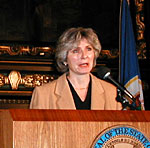By Laura McCallum
Minnesota Public Radio
November 22, 2001
The Ventura administration has released a series of anti-terrorism initiatives. The proposals range from expanded background checks to updated quarantine laws. State officials say they expect widespread legislative support, but privacy advocates are already starting to raise questions.
| |
|
|
|
||
Gov. Ventura says Minnesota is well prepared to deal with a terrorist attack. But he says in examining the state's laws after Sept. 11, state officials found some gaps. Ventura says the state needs more tools to prevent and respond to terrorism.
"A terrorist needs three things to wreak havoc on a community: money, identification and information. Our public safety recommendations address these critical issues," Ventura said.
The recommendations include requiring background checks for drivers who handle hazardous materials and making private certain information, such as pipeline routes and public building blueprints.
Public Safety Commissioner Charlie Weaver says the state should tighten its laws to allow the arrest of anyone trespassing at critical facilities. "Right now, we're one of only two states in the country where you can walk around a nuclear facility, you can walk around a railroad yard filled with explosive chemicals and dangerous chemicals, and they can't detain you, they can't stop you, all they can say is, 'We'd like you to leave,'" according to Weaver.
Other recommendations deal with the threat of bioterrorism. Health Commissioner Jan Malcolm says Minnesota needs to update its century-old quarantine law to allow health officials to isolate people in the event of a widespread disease outbreak.
"We'd like to be able to contain the threat first, and go through the legal procedure as quickly as possible, rather than the other way around," Malcolm said.
| |
|
|
|
||
Malcolm and other state officials say their proposals won't infringe on personal freedom. But some privacy advocates aren't so sure. Richard Neumeister, who lobbies the Legislature on privacy issues, says he's concerned about government agencies sharing more intelligence and collecting more medical data on citizens.
"When government has said, sacrifice, it's in time of war, just don't do it, we have to ask specific questions and then we can make those decisions," according to Neumeister.
He questions the need for updated wire-tap authority. He's also concerned about restricting public data. He says people should be able to find out if a pipeline route is next to their home.
Commissioner Weaver says he and Gov. Ventura feel strongly that the state shouldn't trample on civil liberties in the name of public safety. He says their recommendations don't go as far as the federal "Patriot Act" that gives law enforcement expanded surveillance powers.
"Because there are some things in there that don't make me comfortable - I'm sure don't make the governor comfortable -should you have the ability to listen in on lawyers' conversations with their client? That's part of that act; we aren't prepared to embrace that," Weaver said.
Weaver says he's been talking to key lawmakers about the Ventura administration recommendations, and he expects bipartisan support. Weaver says the initiatives don't cost any money. He says requests for more training and equipment will come later, once state officials know what the federal government will fund.


